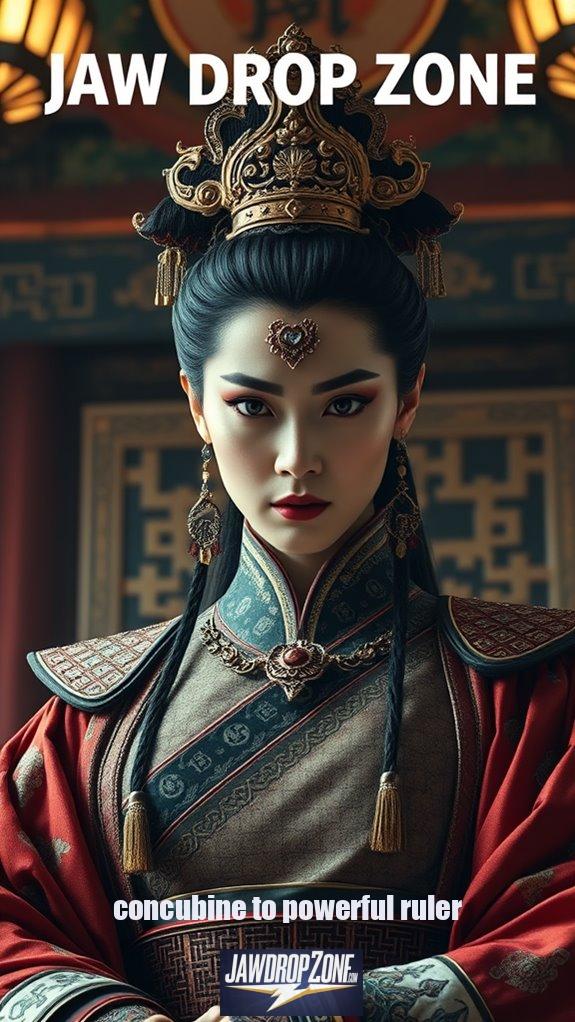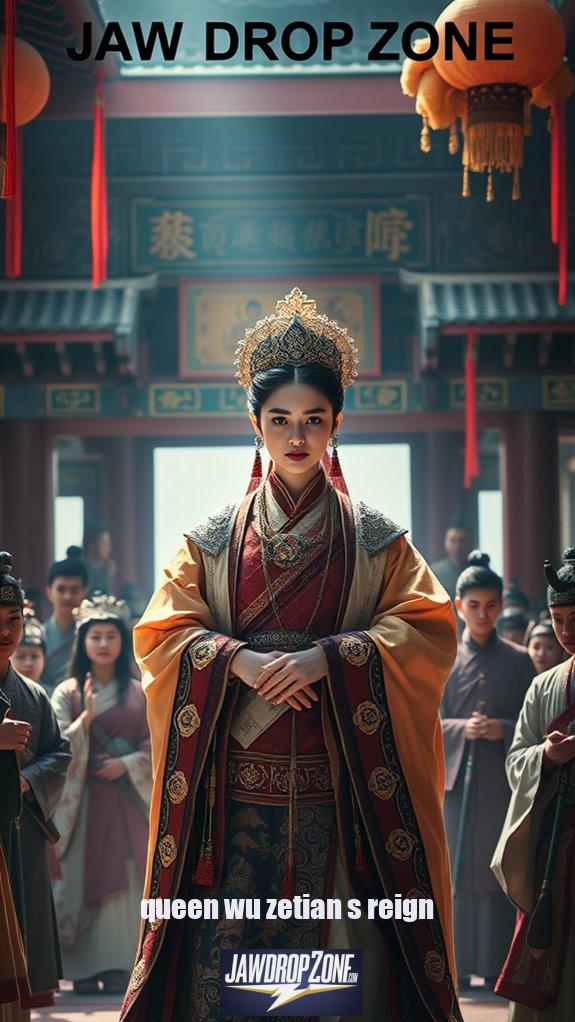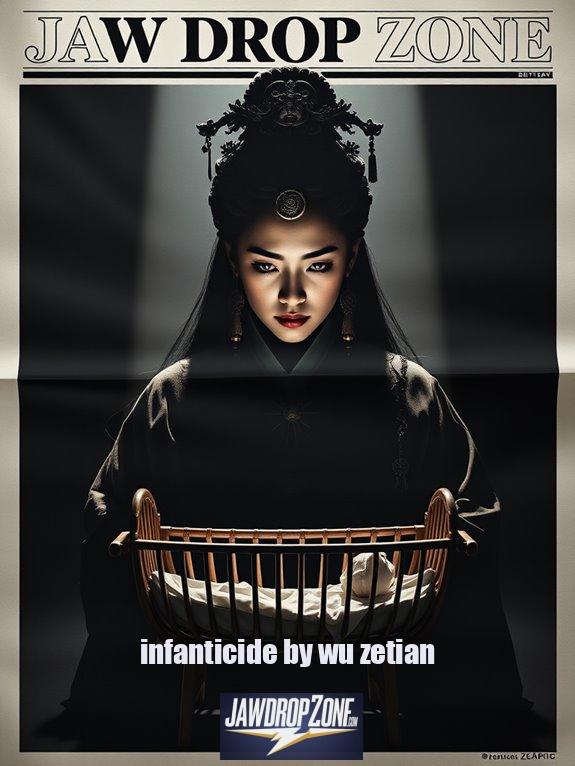Wu Zetian seized imperial power through a masterclass of cunning and ruthlessness. Starting as a mere fifth-rank concubine, she became Emperor Gaozong’s trusted confidante, stepping into the spotlight as his health waned. With a whisper and a ruthless execution of rivals, including the notorious framing of the empress, she swiftly removed threats. Isn’t it astounding how a mere concubine transformed the imperial court into her chessboard? Stick around; there’s even more to this jaw-dropping power play!
Quick Takeaways
- Wu Zetian entered the imperial court as a concubine and gained influence through her close relationship with Emperor Gaozong.
- She utilized strategic framing and ruthless tactics to eliminate rivals, including Empress Wang, to consolidate her power.
- Wu orchestrated the removal of her disloyal son from succession, positioning her other son as a puppet ruler.
- Her military campaigns and political maneuvers further solidified her authority and legacy as a powerful consort.
- By employing fear tactics and secret police, she maintained an iron grip on power, transforming from concubine to the only ruling empress.
Wu Zetian’s Rise From Concubine to Powerful Consort

Envision stepping onto the grand stage of imperial China at just 14 years old, overshadowed by lavish gowns and the whispers of intrigue—this was the incredible start of Wu Zetian’s journey from a mere concubine to a dominant force in the palace!
I mean, how does a fifth-rank concubine parlay her charm into power? It takes immense intelligence and strategy, folks! By forming a close bond with Emperor Gaozong, Wu transformed the court dynamic.
As Gaozong’s health waned, guess who stepped in to steer the ship? When she began making vital decisions during his illness, her influence skyrocketed! Wu’s rise to power was marked by her brutal elimination of rivals, showcasing her relentless pursuit of authority. Wu’s ability to manipulate court politics allowed her to navigate the dangerous waters of the imperial palace adeptly.
Wu didn’t just sit pretty; she was orchestrating military campaigns on the Korean peninsula. It’s astounding how one woman, once dismissed, secured her legacy as a powerful consort.
Could you turn whispers of doubt into proclamations of power? *I created Jaw Drop Zone to showcase such incredible transformations in history!*
Ruthless Tactics on the Path to the Throne

Having already bent the courtiers to her will, Wu Zetian wasn’t about to let anything stand in her way to the throne.
Her tragic loss of a newborn daughter? A perfectly convenient stage for framing Empress Wang as a callous villain. Talk about a plot twist!
But it didn’t stop there. Wu strategically dealt with her own sons, removing Li Zhe for disloyalty and turning Li Dan into a mere puppet, like a marionette dangling before the ultimate show.
And the fate of her rivals? Brutal.
Picture dismemberment and executions as elegantly as one might sip fine wine.
Dismemberments and executions were served with the same finesse as a fine vintage—dark elegance at its most chilling.
Was this sadistic approach excessive? Maybe.
But it worked! With spies everywhere and the iron grip of secret police, she silenced dissent and rapidly centralized power.
Curious about how the empire’s fate intertwined with her ruthless ambition?
I created this website, Jaw Drop Zone, to disclose such jaw-dropping tales of audacity!
Assassination of Rival Concubines

As Wu Zetian tightened her grip on power, she didn’t just eliminate enemies with ruthless efficiency—she did it with an audacity that leaves you questioning how far ambition can stretch.
Conceive of wielding the power to convict rivals of crimes as heinous as infanticide. She accused Empress Wang of murdering her newborn daughter, a chilling tactic that paved the way for Wang’s imprisonment and likely execution.
Was it mere coincidence that Wu’s own daughter died under mysterious circumstances? Some historians suspect she orchestrated this tragedy for a cruel political advantage.
Navigating a male-dominated court, Wu turned whispers and rumors into weapons. Who knew mere gossip could rival steel in court politics?
This drama, rich with intrigue, has certainly inspired the jaw-dropping stories found here at Jaw Drop Zone. After all, history can be more shocking than even the wildest fiction! How grippingly fascinating is that?
References
- https://www.europeanguanxi.com/post/ambitious-through-defiance-wu-zetian-the-last-and-only-empress
- https://ivypanda.com/essays/how-did-wu-zetian-become-the-emperor/
- https://www.historyskills.com/classroom/year-7/wu-zetian/
- https://worldhistoryedu.com/wu-zetian/
- https://ct-by.com/en/how-did-wu-zetian-take-power/
- https://www.historyextra.com/period/medieval/empress-wu-zetian-china-rule-life-reputation/
- https://www.worldhistory.org/Wu_Zetian/
- https://www.historyhit.com/facts-about-wu-zetian-the-only-empress-of-china/
- https://www.ancient-origins.net/ancient-places-asia/wu-zetian-0012453
- https://factsanddetails.com/china/cat2/4sub9/entry-8326.html










